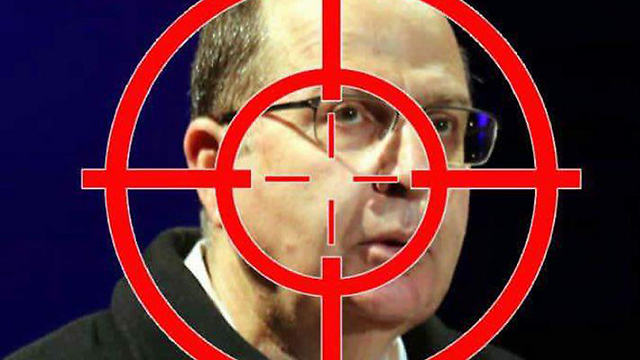
The individual who uploaded a photograph depicting Defense Minister Moshe Ya'alon through the lens of a sniper scope has been exposed. Contrary to Foreign Affairs and Defense Committee Chairman Tzachi Hanegbi's unequivocal conclusions that the offender could not be a member of Likud or sane, it turns out he is, in fact, both.
He's not a senior official in Likud—just a junior and incensed activist. It is not yet clear whether there is any basis on which he can be charged, it at all. Law enforcement officials are presently more interested in his motivation than anything else. However, it's reasonable to assume that it will be difficult for him to upload hateful posts of this sort in the near future.
The average internet user must understand that, today, there is almost no anonymity on the web. Even the inciter who published pictures of the prime minister and Supreme Court justices in Nazi uniforms and the defense minister as the Führer was exposed. It turned out that that this "patriot" chose to express his love from afar, all the way from the United States, and thus was lucky enough to receive a personal visit from FBI agents.
To what extent is the Shin Bet seriously addressing this intensifying atmosphere of hate and its various aspects among right-wing circles that currently focus on the defense minister? The answer: Extremely seriously. No wonder that right-wing leaders at the forefront of criticizing Ya'alon—spearheaded by Education Minister Naftali Bennett—have toned down their rhetoric against him. MK Avigdor Lieberman, while not having opposed the incitement, at least has ceased his criticism. It would appear that someone brought in the politicians for a talk and explained the consequences of their pronouncements.
Last week, during an event held at Beit Berl College in Kfar Saba with Ya'alon's participation, attendees were forced to wait for a full hour outside the hall as security personnel conducted increasingly meticulous checks. Furthermore, the Ya'alon's security detail was noticeably larger.
It's uncertain just how many visits Ya'alon was supposed to make recently in settlements, yeshivas or pre-military preparation programs. However, it is clear that today he feels significantly less comfortable visiting such places for personal security reasons. The Shin Bet certainly would not be keen to suggest that he continue his regular visits to such places. It's difficult to believe that, just a year ago, Ya'alon was considered an invited family member in this sector.
Ya'alon was aware that he was being sought. He knew that a political battle was being waged against him. He was prepared for the possibility that land mines awaited him when it came to issues such as military operations in Gaza or the evacuation of illegal structures.
However, when it comes to the case of the soldier who recently shot a neutralized terrorist in Hebron, he stumbled into an ambush. The defense minister did not anticipate that voicing his opinion would give rise to such wide scale public outcry with him at the center.
The operational picture seemed absolutely clear to him, and he did not, therefore, hesitate to immediately voice his doubts regarding the soldier's actions, intending to prevent Palestinian unrest and an upsurge of international condemnation over what was being portrayed as an IDF execution policy.
Political figures' exploitation of the opportunity to censure Ya'alon took him completely by surprise. Moreover, he never imagined that, when the three leading security figures (the chief of staff, defense minister and prime minister) fell into line on ethical issues, the public would oppose them.
Fanning the flames
It 's fair to assume that in the the Shin Bet's security division's past few weeks of evaluations of the current situation vis-à-vis the growing incitement against Ya'alon held in, the fundamental question being raised by the Shin Bet is: At what point does a smear campaign, intended to cause political "assassination," become a physical threat to the protected person.
The defense minister's central position in the Likud party is not one of the Shin Bet's concerns. However, the atmosphere of incitement which is likely to result in pushing some into committing violent acts against him is a red line which they cannot ignore. The answer to this critical question begins and ends with the intelligence gathered around Ya'alon, and the material which flows from every possible intelligence agency.
It begins with the police monitoring of nationalist figures with criminal backgrounds with the Jewish division of the Shin Bet, which investigates threats emanating from Jewish anarchistic organizations. In addition, all the Arab divisions in the Shin Bet attempt to locate Palestinian terrorist elements likely to hurt the minister.
Anyone who attended the legal proceedings conducted against the soldier who shot dead the immobilized terrorist, including his the prosecutor's charge of manslaughter, would have encountered a bounty of demonstrators: Some of them were citizens who identified with the soldier, while some were affiliated with organizations such as La Familia (a far-right group of football supporters), Kach (an outlawed ultra right-wing Jewish terrorist movement), and Lehava (an anti-assimilation Jewish movement). These people likely know how to carry out attacks.
One method of locating individuals from the Jewish sector who may escalate incitement into violence is the surveillance of social media. During the first two days following the incident in Hebron, almost 30,000 people engaged in social-network conversations on the issue, a number which only continued to increase.
It was necessary to fish out of this gigantic group the problematic people, those who posed a risk or those who could potentially lead investigators to people who can provide important clues. These included people who follow the defense minister, those who showed interest in his schedule, and those who inquired where the minister lives.
As the hostile atmosphere encircling the minister intensifies, so too does the Shin Bet's alertness. While it will not prevent Ya'alon from proceeding with his scheduled as planned, his security arrangements have been tightened. What the public sees—a group of security personnel escorting Ya'alon—is something of an optical illusion. In addition to them is a covert security detail concerned with accumulating intelligence on potential threats. Dozens of people are involved in every public event.
The raw material that fans the flames of incitement around Ya'alon continues to flow even when it seems—and perhaps because it seems —that public interest in the Hebron soldier has dissipated. The fact that Ya'alon has received support from both poles of the political spectrum and from both past and present military and security experts only strengthens the resolve of certain political figures to continue their defamatory campaign against him.
Their methods are familiar.. During the past two weeks, Ya'alon was surprised to hear from a number of high-ranking officers who served with him, including at least one minister of defense, that they had received phone calls from people claiming to be "investigators" looking into Ya'alon's personal and military history, including particularly intimate details.
According to one story, which has already managed to find its way online, a soldier who fought during the first Lebanon War in 1982 claimed that he had witnessed Ya'alon, who was then a commander in the paratroopers' 890th battalion, present at the execution of a Syrian prisoner. During that war, though, Ya'alon commanded an elite commando unit which operated in Lebanon.
The battalion commander of the 890th at the time, then-Lt. Col. Mati Harari, dismissed the story as fictitious. This doesn't bother the "investigators," who continue to rummage around, frantically searching for dirt on Ya'alon which can be passed off as evidence that he participated in incidents significantly more serious than that of the Hebron soldier. This is an attempt to besmirch the reputation of the defense minister with the goal of weakening his public standing and garnering political gains by exploiting a soldier who has committed a transgression.
However, Ya'alon is either not a colorful enough character, or, alternatively, was involved in overly classified affairs. Either way, in the meantime he is not providing the goods: juicy stories which would ultimately produce headlines and send him packing.
Some of these "investigators" did not conceal the fact that they were working for the Hebron soldier's family, which has become—willingly or not—a pawn for political figures who have been riding the coattails of this affair since the day of the shooting three weeks ago.
Those PR-minded politicians who wrote the letter distributed by the soldier's family comparing Abu Jihad's assassination in Tunisia by the elite commando unit which Ya'alon commanded to the Hebron soldier's actions.
Among Ya'alon's close circle, questions are also being raised about the seemingly altruistic motives of Sharon Gal, a former MK for Yisrael Beytenu, who volunteered to act as a public relations mouthpiece for the soldier's family. They believe that Gal's act is simply part of the battle conducted by his former boss, Avigdor Lieberman, in an effort to undermine Ya'alon.
Shin Bet's comprehensive protection
The Hebron shooting affair constitutes only one element of the seemingly legitimate political battles launched by right-wing parties and the leading Likud party against the defense minister. The ultimate goal, however, is to replace the minister and to change the current government policies towards the demands of the West Bank settlers. The strategy is to detach Ya'alon from what is thought to be one of his main sources of power on the right: settlers.
During the Likud primaries, the NGO Regavim, which considers itself at the forefront of the struggle to defend state land in the territories from Arab control, operated against the defense minister. The organization circulated a pamphlet among party officials claiming that Ya'alon abuses his office. At the same time, video clips were distributed in which he was depicted as a demolisher of communities in the West Bank.
The end of 2015 saw the Dreinoff buildings crisis, in which a number of illegal structures were demolished by the IDF in Beit El, a step even requested by some settlers. However, ministers from the Habayit Hayehudi party used the demolition orders as a pretext to attack the defense minister and label him an enemy of the settlements. In January 2016, the evacuation of Jews from two buildings near the Cave of the Patriarchs in Hebron at the behest of the minister marked a turning point in which Ya'alon was, once again, portrayed as an enemy. The method worked.
Subsequently, even Ya'alon's natural home turf, the pre-military preparation programs, suddenly felt less like home. Habayit Hayehudi, Yisrael Beytenu and representatives of the more extreme wing of Likud, such as Moshe Feiglin, succeeded in undermining his alliance with the settlers.
Then came the affair of shaving beards in the IDF. Despite the fact that the decision was not taken by Ya'alon, the relevant political parties explained to the electorate that the defense minister was harming the Jewish state.
Matters reached their peak when the chief of the General Staff decided to transfer the matter of the Jewish Affairs Division from the responsibility of the Military Rabbinate to the head of the Personnel Directorate. From their point of view, this provided indisputable proof that Ya'alon had crossed the line. Support for LGBT people? Standing by the Supreme Court? There can be no doubt that Ya'alon is no longer one of us, the attitude went.
Now, the Hebron soldier fell into their lap. The same public figures and the same parties leading the campaign against the defense minister, intending to deliver a political blow. However, they did not take into account that labeling him as an enemy of the settlements is likely to prompt violence among certain people, the kind of people who are determined to prevent another Likud member like Ariel Sharon from betraying them by uprooting Jews from biblical soil.
When dealing with matters of personal security, Shin Bet's approach is comprehensive. Even if there is not an advance warning about a specific individual planning to attack the defense minister on a specific day, a mere suspicion of a physical attack is sufficient to treat it as a concrete threat. This is one of the key lessons taken from the assassination of former prime minister Yitzhak Rabin in 1995. Indeed, his assassin, Yigal Amir was influenced by a similar atmosphere.
The defense minister is presented today not only as someone who is harming right-wing values, but also as someone who has defamed an IDF soldier. There are people who are likely to conclude that one of the ways of removing him before he causes more damage is to resort to a physical strike.
There are a few more similarities: using the Nazi uniform, for example. Security services take seriously the "clothing" of the heads of state in such uniforms, particularly in light of the well-known Israeli phrase: "Nazis should and must be killed."
Three decades ago, it was no easy task to identify the designer of the famous poster depicting Rabin as a Nazi. Today, however, the matter is far less complicated. Private Israeli companies equipped with advanced technology know how to track movements on the internet, including political incitement. Locating the inciter's address is a matter of days, depending on how technologically sophisticated he is. This is most likely the method by which the individual who posted a picture of Ya'alon in the crosshairs of a sniper rifle target was located.
In addition to the private companies, intelligence agencies are also capable of monitoring internet activities. During recent months, against a background of security threats sparked by intense incitement propagated on Palestinian social media, the technology designed to monitor internet activity underwent significant updates. Technology development experts in the Military Intelligence Directorate and the Shin Bet made exceptional efforts.
Indeed, to fully appreciate the importance that the Shin Bet has placed in obtaining the highest level of intelligence in this field, appreciate that one of every six employees, so it is said, is employed in a technological capacity. This amounts to almost double those employed during the last decade. Moreover, human resources departments in the Shin Bet responsible for technological intelligence increased during the last four years by more than 25%, which are mostly engineers.
The seven people in Israel who must, by law, be protected by the Shin Bet are the prime minister, the defense minister, the foreign minister, the president, the president of the Supreme Court, the head of opposition and the speaker of the Knesset. In addition, for a set period of time, past defense ministers and prime ministers are temporarily protected. Security details are also assigned by a special committee to individuals outside of governmental or security offices, but who are considered potential targets. These include individuals such as Benjamin Netanyahu's children and his wife. Ariel Sharon also continued to receive protection even as he lay in a coma for years in hospital.
On Tuesday, Ya'alon met with military journalists. From his point of view and that of the army, the Hebron soldier incident is over. The classified operational investigation is true and thorough. Whatever happened afterwards, when lawyers and PR figures entered the fray, is of no relevance to the military.
There is no hesitation whatever in the IDF with regards to the soldier's actions, and one can't force norms upon it to which it does not subscribe, nor those with which it is unable to live. But the affair, taken as a whole, reflects a political struggle against the defense minister and the government's policies. The struggle has certainly left scars among the public, which has lost faith in the army. Furthermore, the affair has fanned the flames of incitement and violence. The Hebron soldier will be quickly forgotten, but the story has not yet concluded.


















